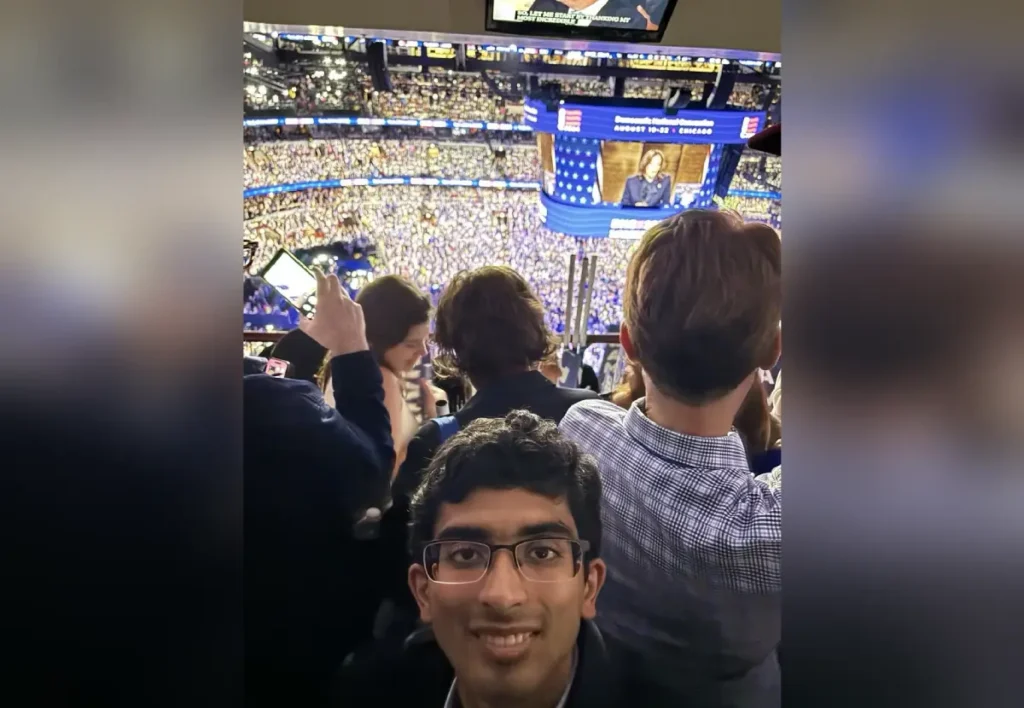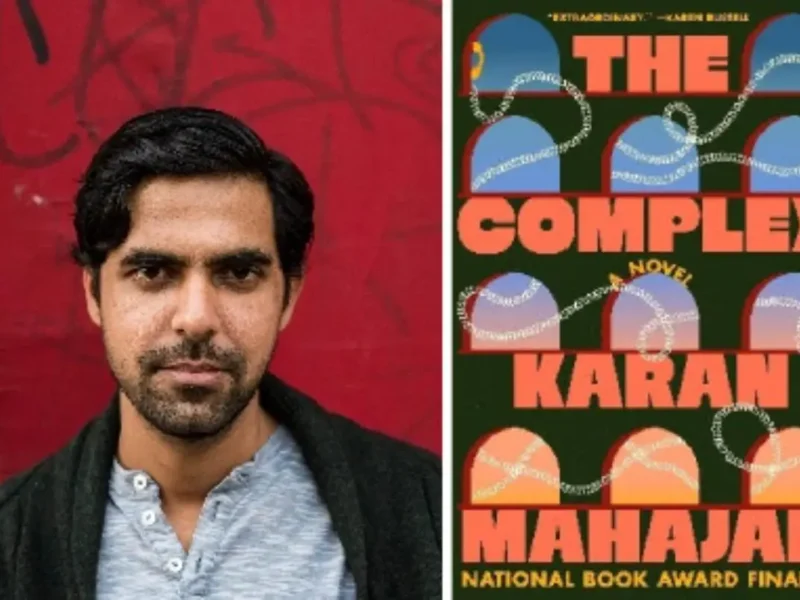
My Upbringing Shaped My Public Service Ideals: Ashwin Ramaswami
BY REENA RATHORE
Ashwin Ramaswami, the Gen Z Democratic candidate running for a Georgia state Senate seat, is poised to bring a fresh perspective to the state’s political landscape. Representing District 48, he is also making headlines for taking on a Republican candidate who was indicted in 2023 for allegedly trying to overturn the results of the 2020 election.
Born and raised in Johns Creek, Georgia, the 25-year-old’s connection to his community runs deep and is on the brink of making history as the first Indian American and the youngest representative ever elected in Georgia with a background that spans technology and law.
Ramaswami, whose opponent Shawn Still was indicted alongside former President Donald Trump for the Jan.6, 2021, insurrection at the US Capitol, is campaigning on a platform centered around education, healthcare, and technology.

After earning a computer science degree from Stanford and a law degree from Georgetown and working on building tech startups and running a consultancy company, Ramaswami worked on election security in the Cybersecurity and Infrastructure Security Agency, where he saw firsthand the critical need for principled leadership. “I realized that if you really want to make an impact, the best way is to come back home and stand up for what’s right and what’s best for our community,” he told India-West, underscoring his decision to run for office after the indictment.
Ramaswami is passionate about the need to protect voting rights and ensure election security, and has been endorsed by Senator Jon Ossoff, who described him as a “tireless advocate for democracy.”
“It shouldn’t be a Democrat or Republican issue. It’s an issue that cuts across,” Ramaswami asserted. “My whole message is that I used to work on election security with both Democrats and Republicans.”
His bid for the State Senate has garnered notable support, including an endorsement from Congresswoman Lucy McBath of Georgia’s seventh Congressional district, Indian American Congressman Ro Khanna, South Asians for America, and Indian American Impact.

Ramaswami brings a unique expertise to the table, particularly in the realm of technology. His experience working in the consumer protection department of the Georgia Attorney General’s Office exposed him to the challenges that state governments face in regulating new technologies. “I was the only person in that room with a technology background,” he recalled, highlighting the gap in understanding that often exists between policymakers and the rapidly evolving tech landscape.
Highlighting the importance of informed leadership and balancing innovation with public safety, he added: “We need to make sure policymakers really understand these technologies.”
Ramaswami’s parents, both IT professionals, immigrated from Tamil Nadu in 1990. His journey into politics is also deeply rooted in his upbringing. “I grew up going to Chinmaya Mission Bala Vihar, a community center where I learned about my Hindu religious traditions and values,” he shared.
This early exposure to the values of integrity, honesty, and Seva, or community service, shaped his public service ethos, he further noted, saying, “I’ve always had the mindset of being very grateful for growing up here and wanting to give back.”
Ramaswami is particularly focused on bridging the cultural and demographic divides within his district by engaging younger voters. “The reality is, regardless of where someone is on the political spectrum, they realize that young people’s representation is not here,” he said. His campaign is making a concerted effort to reach out to high schoolers and college students, offering them a voice in the political process.
In running against an incumbent, particularly in a district that has traditionally leaned Republican, Ramaswami sees an opportunity. “Shawn Still, even though he’s the incumbent, he’s barely known within the district,” he stated, citing polling data that showed that over 70 percent of voters don’t recognize Still’s name. “That shows he’s not necessarily out in the community, but also that there’s an opportunity here where a lot of people might just be voting for him because of party lines, but not because based on his own record.”
Ramaswami believes his campaign, which presents him as a moderate candidate focused on key issues, has the potential to attract disillusioned voters. “I’m presenting myself as the normal candidate, someone who’s actually going to work on the issues and not get involved in all this extremism,” he said.
A significant part of his strategy involves mobilizing the district’s large Asian American and Pacific Islander community, especially the Indian American population whose political influence has surged in recent years, a shift that Ramaswami attributes to increased activism and engagement, particularly since 2020.
“These are people I grew up with. They know I’m in this for the right reasons in terms of helping out the community,” Ramaswami said. “For over a decade, it was held by the former chair of the Georgia GOP, David Schaefer. He didn’t have an opponent in a very, very long time. Finally, in 2018, a Democrat challenged him and actually beat him. And since then, the district has been changing.”
The local community’s impact is evident in the shifting political landscape of his district, once a deep red stronghold, he reckoned.
“We’ve raised nearly half a million at this point…. it shows the fact that Indian Americans are able to get this kind of support and really get the resources needed to win. With Kamala Harris at the top of the ballot, people are starting to realize that their own backgrounds are also represented in presidential politics… The Democratic enthusiasm, it’s really through the roof,” he said, describing the increased turnout and volunteerism at campaign events across the state.
Ramaswami’s connection to Vice President Kamala Harris is personal —his mother grew up in the same neighborhood as Harris’ mother. He sees her rise as emblematic of the increasing importance of multiculturalism in American politics. “Kamala Harris is not only able to relate to and really be respected by the Indian American community, she also has such strong roots in the Black community. And what it shows is that it’s not either or, you’re not just one race or the other…It’s more about the best of both worlds in terms of culture in America versus traditional Indian values,” he said. “The fact that Trump keeps attacking her identity, he knows that that’s a big superpower for her.”
His priorities include “common sense” gun laws, fully funding the education system, reducing class sizes, and increasing mental health resources for students, ensuring that schools are well-equipped to foster success.
On the healthcare front, Ramaswami is adamant about the need for Medicaid expansion in Georgia, one of the few states yet to do so, which “could fix a lot of healthcare costs.” He also advocates for protecting reproductive health care, and is critical of Georgia’s restrictive abortion laws, describing them as “far too extreme” and emphasizing the need to protect personal health decisions.
He called for policies that genuinely support families, such as paid childcare and parental leave, and a return to the protections of Roe v. Wade, stressing that Georgia should be a place where the “future can be realized, not…in which people are being hindered in terms of being able to achieve what they want and their goals.”



